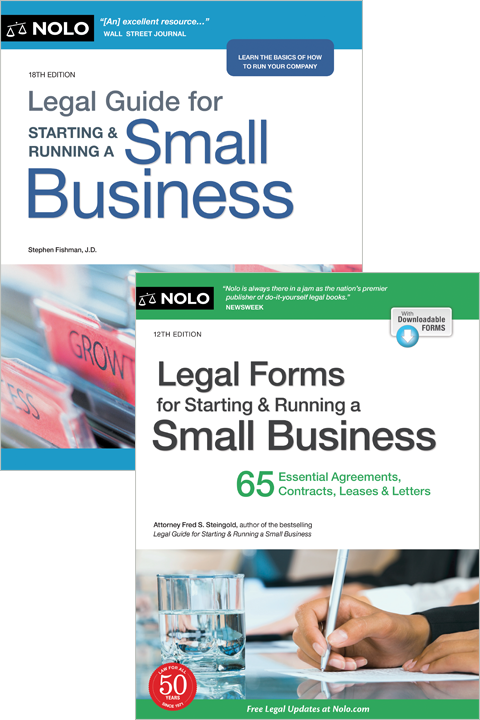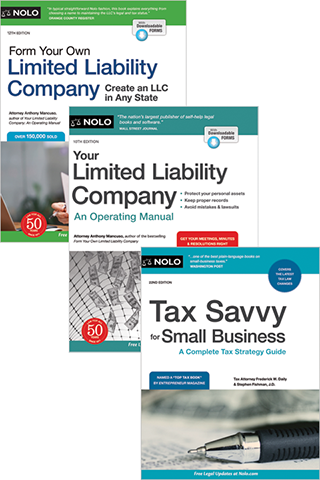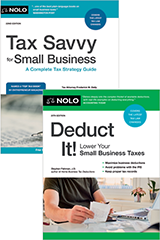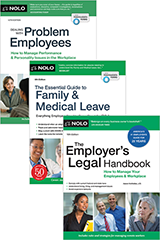Nolo's Start & Run a Business Bundle
- Bundle Products
- Small Business FAQs
Should I convert my sole proprietorship into a corporation or LLC?
LLCs and corporations offer great benefits to some small businesses, but for others, staying as a sole proprietorship or partnership saves money, time, and effort. The main benefit of an LLC or a corporation is that the owners’ personal liability for business debts is limited. So generally, corporations and LLCs make sense for business owners who either run the risk of being sued or of piling up a lot of business debts, or have substantial personal assets they want to protect from business creditors.
There are also tax consequences of incorporating or forming an LLC. A corporation is an independent legal and tax entity, separate from the people who own and manage it. As a result, the owners don't use their personal tax returns to pay tax on corporate profits -- the corporation itself pays these taxes. Owners pay personal income tax only on money they take from the corporation in the form of salaries, bonuses, and the like. When it comes to taxes, LLCs are more like partnerships: the owners of an LLC pay taxes on their shares of the business income on their personal tax returns.
Do I need to get an Employer Identification Number for my business?
An employer identification number (EIN) lets the IRS track wages and other payments from a business to its employees and owners. Whether you're required to get an EIN for your business depends on how the business is set up.
Sole proprietorships. If you don't plan on hiring employees (and you won't have a Keogh plan or run a company that will owe federal excise taxes), you don't need to apply for an EIN. You can use your own Social Security number for federal tax purposes. If your business plans on hiring employees in the next 12 months, you need to apply for an EIN.
Corporations. All C corporations and S corporations need an EIN.
Partnerships. All general partnerships and limited partnerships need an EIN.
LLCs. If your LLC will hire employees or have multiple members, you need an EIN for the LLC. Some one-member LLCs, however, can use the owner’s own Social Security number for IRS purposes.
--Single-member LLCs with no employees. If your one-member LLC and you do not plan on hiring employees (and you will not have a Keogh plan or run a trucking, transport, or similar company that will owe federal excise taxes), you do not need an EIN for your business. You may use your own Social Security number for federal tax purposes. However, some lenders may require you to have an EIN. You can always get an EIN for the LLC if you wish, either to make doing business with banks easier or just to separate your personal finances from your business's finances as much as possible.
--Single-member LLCs with employees. If your one-member LLC plans to hire employees in the next 12 months, you need to apply for an EIN. The IRS may actually assign you two EINs: one for the LLC and one for you, the sole owner. Employment taxes must be reported under the LLC's EIN, and money paid from the LLC to you must be reported under your EIN number. (So if you are converting a sole proprietorship to an LLC and you have hired (or plan to hire) employees, but you already have an EIN, you may need to apply for another EIN.)
--If your LLC elects to be taxed as a corporation. In this case, you’ll need to apply for an EIN.
Should I hire a bookkeeper?
If you can afford to hire bookkeeping help, it can be a big help, freeing you from some of the day-to-day work of keeping track of finances. But you’ll still be responsible for any bookkeeping and accounting errors. So you still need have a good grasp of general bookkeeping concepts—and stay aware of how your business's records are being kept.
I’d like to buy a good business—where do I start?
Start with a business you know a lot about, start your search close to home. Could you buy the company you’re working for now, for example? Ask business associates if they know of similar businesses that might be for sale. Many of the best business opportunities surface by word of mouth -- and are snapped up before their owners ever list them for sale.
You might get help from a business broker, but don’t rely on them for advice about whether or not to buy a particular business. They don’t make a commission unless you buy.
If a customer doesn’t pay, can I sue in small claims court?
In many small claims courts, more than 60% of the cases are filed by businesses, who find it an affordable and efficient way to solve disputes and collect bills. Because you don’t need a lawyer or collection agency, you’ll keep all of what you end up collecting.
Just filing a case and sending notice of it to the defendant (the person you’re suing) may be enough to shake some money loose from the person who owes you.
If you do go to court, don’t be surprised if the person you’re suing doesn’t even show up; it’s common, if it’s clear that you are owed the money. Still, to win you must prove, with reliable evidence, that the debt is owed to you. If there’s a genuine dispute—for example, a customer says you didn’t deliver what you promised—then the court may order the defendant to pay less than the total amount you’re suing for.
.





